【世界经典演讲词】爱因斯坦《我的世界观》
- 格式:docx
- 大小:17.74 KB
- 文档页数:2
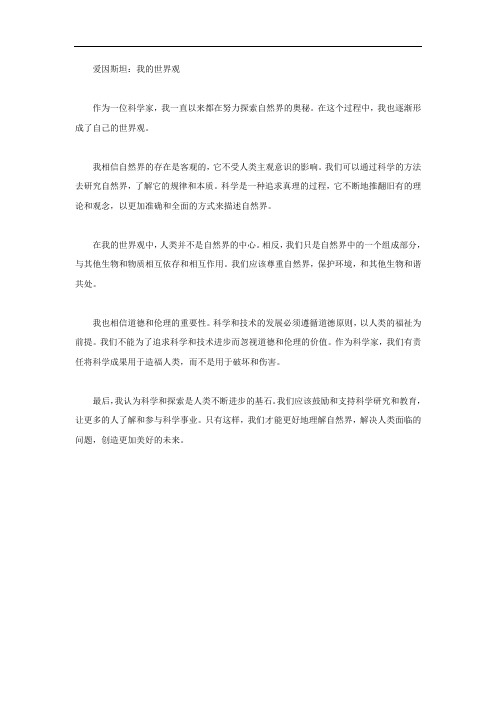
爱因斯坦:我的世界观
作为一位科学家,我一直以来都在努力探索自然界的奥秘。
在这个过程中,我也逐渐形成了自己的世界观。
我相信自然界的存在是客观的,它不受人类主观意识的影响。
我们可以通过科学的方法去研究自然界,了解它的规律和本质。
科学是一种追求真理的过程,它不断地推翻旧有的理论和观念,以更加准确和全面的方式来描述自然界。
在我的世界观中,人类并不是自然界的中心。
相反,我们只是自然界中的一个组成部分,与其他生物和物质相互依存和相互作用。
我们应该尊重自然界,保护环境,和其他生物和谐共处。
我也相信道德和伦理的重要性。
科学和技术的发展必须遵循道德原则,以人类的福祉为前提。
我们不能为了追求科学和技术进步而忽视道德和伦理的价值。
作为科学家,我们有责任将科学成果用于造福人类,而不是用于破坏和伤害。
最后,我认为科学和探索是人类不断进步的基石。
我们应该鼓励和支持科学研究和教育,让更多的人了解和参与科学事业。
只有这样,我们才能更好地理解自然界,解决人类面临的问题,创造更加美好的未来。

The World As I See It- Albert Einstein -How strange is the lot of us mortals! Each of us is here for a brief sojourn; for what purpose be knows not, though he sometimes thinks he senses it. But without deeper reflection one knows from daily life that one exists for other people-first of all for those upon whose smiles and well-being our own happiness is wholly dependent, and then for the many, unknown to us, to whose destinies we are bound by the ties of sympathy. A hundred times every day I remind myself that my inner and outer life are based on the labors of other men,living and dead, and that I must exert myself in order to give in the same measure as I have received and am still receiving. I am strongly drawn to a frugal life and am often oppressively aware that I am engrossing an undue amount of the labor of my fellow-men. I regard class distinctions as unjustified and, in the last resort, based on force. I also believe that a simple and unassuming life is good for everybody, physically and mentally.I do not at all believe in human freedom in the philosophical sense. Everybody acts not only under external compulsion but also in accordance with inner necessity. Schopenhauer‘s saying, "A man can do what he wants,but not want what he wants," has been a very real inspiration to me since my youth; it has been a continual consolation in the face of life‘s hardships, my own and others‘, and an unfailing well-spring of tolerance. This realization mercifully mitigates the easily paralyzing sense of responsibility and prevents us from taking ourselves and other people all too seriously; it is conducive to a view of life which, in particular, gives humor its due.To inquire after the meaning or object of one‘s own existence or that of all creatures has always seemed to me absurd from an objective point of view. And yet everybody has certain ideals which determine the direction of his endeavors and his judgments. In this sense I have never looked upon ease and happiness as ends in themselves-this ethical basis I call the ideal of a pigsty. The ideals which have lighted my way, and time after time have given me new courage to face life cheerfully, have been Kindness, Beauty, and Truth. Without the sense of kinship with men of like mind, without the occupation with the objective world,the eternally unattainable in the field of art and scientific endeavors, life would have seemedto me empty. The trite objects of human efforts-possessions,outward success, luxury-have always seemed to me contemptible.My passionate sense of social justice and social responsibility has always contrasted oddly with my pronounced lack of need for direct contact with other human beings and human communities. I am truly a "lone traveler" and have never belonged to my country, my home, my friend, or even my immediate family, with my whole heart; in the face of all these ties, I have never lost a sense of distance and a need for solitude-feelings which increase with the years. One becomes sharply aware, but without regret,of the limits of mutual understanding and consonance with other people. No doubt, such a person loses some of his innocence and unconcern; on the other hand, he is largely independent, of the opinions, habits, and judgments of his fellows and avoids the temptation to build his inner equilibrium upon such insecure foundations.My political ideal is democracy. Let every man be respected as an individual and no man idolized. It is an irony of fate that I myself have been the recipient of excessive admiration and reverence from my fellow-being, through no fault, and no merit, of my own. The cause of this may well be the desire, unattainable for many, to understand the few ideas to which I have with my feeble powers attained through ceaseless struggle. I am quite aware that it is necessary for the achievement of the objective of an organization that one man should do the thinking and directing and generally bear the responsibility. But the led must not be coerced, they must be able to choose their leader. An autocratic system of coercion, in my opinion, soon degenerates. For force always attracts men of low morality, and I believe it to be an invariable rule that tyrants of genius are succeeded by scoundrels, For this reason I have always been passionately opposed to systems such as we see in Italy and Russia today. The thing that has brought discredit upon the form of democracy as it exists in Europe today is not to be laid to the door of the democratic principle as such, but to the lack of stability of governments and to the impersonal character of the electoral system. I believe that in this respect the United States of America have found the right way. They have a President powers really to exercise his responsibility. What I value, on the other hand, in the German political system is the more extensive provision that it makes for the individual in case of illness or need. The really valuable thing in the pageant of human life seems to me not the political state, but the creative, sentient individual, the personality; it alone creates the noble and the sublime, while the herd as such remains dull in thought and dull in feeling. This topic brings me to that worst outcrop of herd life,the military system,which I abhor. That a man can take pleasure in marching in fours to the strains of a band is enough to make me despise him. He has only been given his big brain by mistake; unprotected spinal marrow was all he needed. This plaguespot of civilization ought to be abolished with all possible speed. Heroism on command, senseless violence, and all the loathsome nonsense that goes by the name of patriotism - how passionately I hate them! How vile and despicable seems war to me! I would rather be hacked in pieces than take part in such an abominable business. My opinion of the human race is high enough that I believe this bogey would have disappeared long ago, had the sound sense of the peoples not been systematically corrupted by commercial and political interests acting through the schools and the Press.The most beautiful experience we can have is the mysterious. It is the fundamental emotion which stands at the cradle of true art and true science . Whoever does not know it and can no longer wonder, no longer marvel, is as good as dead, and his eyes are dimmed. It was the experience of mystery - even if mixed with fear - that engendered religion. A knowledge of the existence of something we cannot penetrate, our perceptions of the profoundest reason and the most radiant beauty, which only in their most primitive forms are accessible to our minds - it is this knowledge and this emotion that constitute true religiosity; in this sense, and in this alone, I am a deeply religious man. I can not conceive of a God who rewards and punishes his creatures, or has a will of the kind that we experience in ourselves. Neither can I nor would I want to conceive of an individual that survives his physical death; let feeble souls, from fear or absurd egoism, cherish such thoughts. I am satisfied with the mystery of the eternity of life and with the awareness and a glimpse of the marvelous structure of the existing world, together with the devoted striving to comprehend a portion, be it ever so tiny, of the Reason that manifests itself in nature我的世界观阿尔伯特·爱因斯坦我们这些总有一死的人的命运多么奇特!我们每个人在这个世界上都只作一个短暂的逗留;目的何在,却无从知道,尽管有时自以为对此若有所感。

爱因斯坦《我的世界观》赏析
爱因斯坦《我的世界观》赏析
一.背景简介
20年代末30年代初,也是世界滑向战争的动荡岁月。
法西斯专制势力正企图掀起战争暴力和其它种种暴行,爱因斯坦关注时事,对国家社会命运也进行深入的思考。
年轻时受基督教和犹太教思想的濡染,但在接触了当时的科技读物后很快开始怀疑《圣经》的讲义,转而钻研科学。
后接受斯宾诺莎泛神论,认为所谓上帝即自然,宇宙是自发自为的,探索自然的规律和宇宙的奥秘就是最高的宗教。
本文发表于1930年,译名或为《我的信仰》。
本文是一篇演讲词,属议论文范畴。
二.结构内容
1.、(1自然段)认识为别人而生存的(论点)
对生命价值的初悟
对劳动的尊重
向往简朴的生活
反对阶级划分
2-4)自己对待生活的态度
2、人生不可能享有真正的自由(要遵循客观规律“叔本华”)
3、生活的目的在于追求真、善、美,而不是安逸和享乐猪栏的理想,(庸俗的目标)
4、对社会的责任感——坚持独立思考(“孤独的旅客”)(保持科学家。

我的世界观阿尔伯特·爱因斯坦我们这些总有一死的人的命运多么奇特!我们每个人在这个世界上都只作一个短暂的逗留;目的何在,却无从知道,尽管有时自以为对此若有所感。
但是,不必深思,只要从日常生活就可以明白:人是为别人而生存的──首先是为那样一些人,我们的幸福全部依赖于他们的喜悦和健康;其次是为许多我们所不认识的人,他们的命运通过同情的纽带同我们密切结合在一起。
我每天上百次的提醒自己:我的精神生活和物质生活都是以别人(包括生者和死者)的劳动为基础的,我必须尽力以同样的分量来报偿我所领受了的和至今还在领受着的东西。
我强烈地向往着俭朴的生活。
并且时常发觉自己占用了同胞的过多劳动而难以忍受。
我认为阶级的区分是不合理的,它最后所凭借的是以暴力为根据。
我也相信,简单淳朴的生活,无论在身体上还是在精神上,对每个人都是有益的。
我完全不相信人类会有那种在哲学意义上的自由。
每一个人的行为不仅受着外界的强制,而且要适应内在的必然。
叔本华说:“人虽然能够做他所想做的,但不能要他所想要的。
”这句格言从我青年时代起就给了我真正的启示;在我自己和别人的生活面临困难的时候,它总是使我们得到安慰,并且是宽容的持续不断的源泉。
这种体会可以宽大为怀地减轻那种容易使人气馁的责任感,也可以防止我们过于严肃地对待自己和别人;它导致一种特别给幽默以应有地位的人生观。
要追究一个人自己或一切生物生存的意义或目的,从客观的观点看来,我总觉得是愚蠢可笑的。
可是每个人都有一些理想,这些理想决定着他的努力和判断的方向。
就在这个意义上,我从来不把安逸和享乐看作生活目的本身──我把这种伦理基础叫做猪栏的理想。
照亮我的道路,是善、美和真。
要是没有志同道合者之间的亲切感情,要不是全神贯注于客观世界──那个在艺术和科学工作领域里永远达不到的对象,那么在我看来,生活就会是空虚的。
我总觉得,人们所努力追求的庸俗目标──财产、虚荣、奢侈的生活──都是可鄙的。
我有强烈的社会正义感和社会责任感,但我又明显地缺乏与别人和社会直接接触的要求,这两者总是形成古怪的对照。
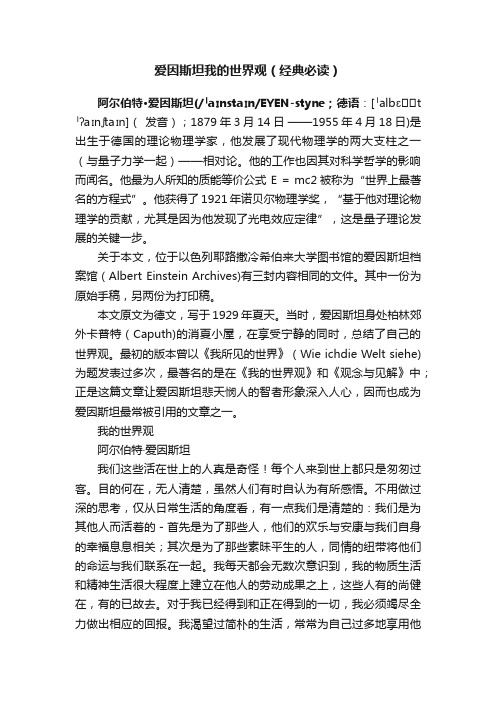
爱因斯坦我的世界观(经典必读)阿尔伯特·爱因斯坦(/ˈaɪnstaɪn/EYEN-styne;德语:[ˈalbɛɐɐt ˈʔaɪnʃtaɪn](发音);1879年3月14日——1955年4月18日)是出生于德国的理论物理学家,他发展了现代物理学的两大支柱之一(与量子力学一起)——相对论。
他的工作也因其对科学哲学的影响而闻名。
他最为人所知的质能等价公式 E = mc2被称为“世界上最著名的方程式”。
他获得了1921年诺贝尔物理学奖,“基于他对理论物理学的贡献,尤其是因为他发现了光电效应定律”,这是量子理论发展的关键一步。
关于本文,位于以色列耶路撒冷希伯来大学图书馆的爱因斯坦档案馆(Albert Einstein Archives)有三封内容相同的文件。
其中一份为原始手稿,另两份为打印稿。
本文原文为德文,写于1929年夏天。
当时,爱因斯坦身处柏林郊外卡普特(Caputh)的消夏小屋,在享受宁静的同时,总结了自己的世界观。
最初的版本曾以《我所见的世界》(Wie ichdie Welt siehe)为题发表过多次,最著名的是在《我的世界观》和《观念与见解》中;正是这篇文章让爱因斯坦悲天悯人的智者形象深入人心,因而也成为爱因斯坦最常被引用的文章之一。
我的世界观阿尔伯特·爱因斯坦我们这些活在世上的人真是奇怪!每个人来到世上都只是匆匆过客。
目的何在,无人清楚,虽然人们有时自认为有所感悟。
不用做过深的思考,仅从日常生活的角度看,有一点我们是清楚的:我们是为其他人而活着的-首先是为了那些人,他们的欢乐与安康与我们自身的幸福息息相关;其次是为了那些素昧平生的人,同情的纽带将他们的命运与我们联系在一起。
我每天都会无数次意识到,我的物质生活和精神生活很大程度上建立在他人的劳动成果之上,这些人有的尚健在,有的已故去。
对于我已经得到和正在得到的一切,我必须竭尽全力做出相应的回报。
我渴望过简朴的生活,常常为自己过多地享用他人的劳动成果而深感不安。

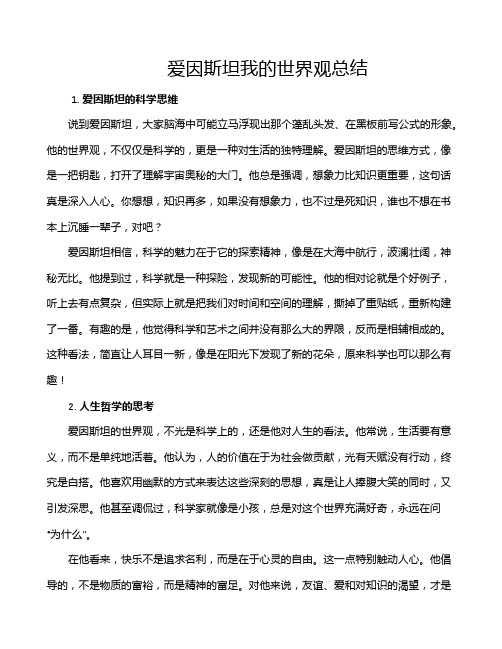
爱因斯坦我的世界观总结1. 爱因斯坦的科学思维说到爱因斯坦,大家脑海中可能立马浮现出那个蓬乱头发、在黑板前写公式的形象。
他的世界观,不仅仅是科学的,更是一种对生活的独特理解。
爱因斯坦的思维方式,像是一把钥匙,打开了理解宇宙奥秘的大门。
他总是强调,想象力比知识更重要,这句话真是深入人心。
你想想,知识再多,如果没有想象力,也不过是死知识,谁也不想在书本上沉睡一辈子,对吧?爱因斯坦相信,科学的魅力在于它的探索精神,像是在大海中航行,波澜壮阔,神秘无比。
他提到过,科学就是一种探险,发现新的可能性。
他的相对论就是个好例子,听上去有点复杂,但实际上就是把我们对时间和空间的理解,撕掉了重贴纸,重新构建了一番。
有趣的是,他觉得科学和艺术之间并没有那么大的界限,反而是相辅相成的。
这种看法,简直让人耳目一新,像是在阳光下发现了新的花朵,原来科学也可以那么有趣!2. 人生哲学的思考爱因斯坦的世界观,不光是科学上的,还是他对人生的看法。
他常说,生活要有意义,而不是单纯地活着。
他认为,人的价值在于为社会做贡献,光有天赋没有行动,终究是白搭。
他喜欢用幽默的方式来表达这些深刻的思想,真是让人捧腹大笑的同时,又引发深思。
他甚至调侃过,科学家就像是小孩,总是对这个世界充满好奇,永远在问“为什么”。
在他看来,快乐不是追求名利,而是在于心灵的自由。
这一点特别触动人心。
他倡导的,不是物质的富裕,而是精神的富足。
对他来说,友谊、爱和对知识的渴望,才是生活的真谛。
想想我们日常生活中,那些忙忙碌碌追求物质的人,是否有时也应该停下来,看看周围的美好?2.1. 对和平的追求爱因斯坦的世界观中,还有一个重要的部分就是他对和平的执着追求。
经历过战争的人,心中都有一份对和平的向往。
他曾经说过:“战争是人类最大的悲剧。
”这句简单的道理,却在历史的长河中反复被验证。
他认为,科学技术本身并没有好坏之分,关键在于人类如何使用它。
爱因斯坦一直呼吁,用科学的力量去促进和平,而不是制造武器。
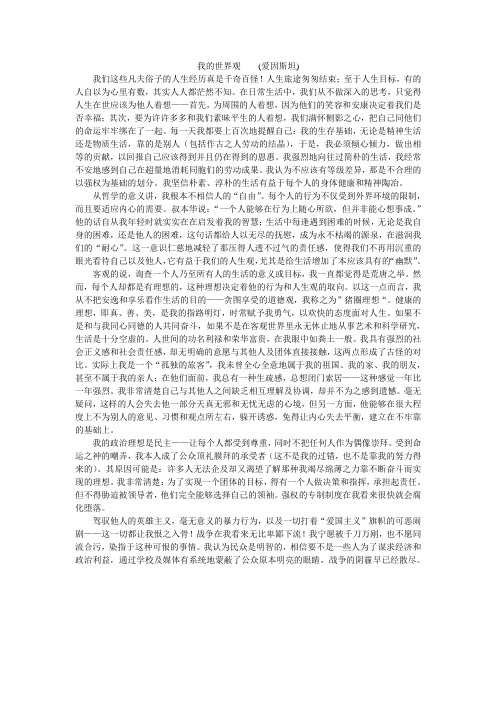
我的世界观(爱因斯坦)我们这些凡夫俗子的人生经历真是千奇百怪!人生旅途匆匆结束;至于人生目标,有的人自以为心里有数,其实人人都茫然不知。
在日常生活中,我们从不做深入的思考,只觉得人生在世应该为他人着想——首先,为周围的人着想,因为他们的笑容和安康决定着我们是否幸福;其次,要为许许多多和我们素昧平生的人着想,我们满怀侧影之心,把自己同他们的命运牢牢绑在了一起。
每一天我都要上百次地提醒自己:我的生存基础,无论是精神生活还是物质生活,靠的是别人(包括作古之人劳动的结晶),于是,我必须倾心倾力,做出相等的贡献,以回报自己应该得到并且仍在得到的恩惠。
我强烈地向往过简朴的生活,我经常不安地感到自己在超量地消耗同胞们的劳动成果。
我认为不应该有等级差异,那是不合理的以强权为基础的划分。
我坚信朴素、淳朴的生活有益于每个人的身体健康和精神陶冶。
从哲学的意义讲,我根本不相信人的“自由”。
每个人的行为不仅受到外界环境的限制,而且要适应内心的需要。
叔本华说:“一个人能够在行为上随心所欲,但并非能心想事成。
”他的话自从我年轻时就实实在在启发着我的智慧;生活中每逢遇到困难的时候,无论是我自身的困难,还是他人的困难,这句话都给人以无尽的抚慰,成为永不枯竭的源泉,在滋润我们的“耐心”。
这一意识仁慈地减轻了那压得人透不过气的责任感,使得我们不再用沉重的眼光看待自己以及他人,它有益于我们的人生观,尤其是给生活增加了本应该具有的“幽默”。
客观的说,询查一个人乃至所有人的生活的意义或目标,我一直都觉得是荒唐之举。
然而,每个人却都是有理想的,这种理想决定着他的行为和人生观的取向。
以这一点而言,我从不把安逸和享乐看作生活的目的——贪图享受的道德观,我称之为”猪圈理想“。
健康的理想,即真、善、美,是我的指路明灯,时常赋予我勇气,以欢快的态度面对人生。
如果不是和与我同心同德的人共同奋斗,如果不是在客观世界里永无休止地从事艺术和科学研究,生活是十分空虚的。

爱因斯坦我的世界观
爱因斯坦的世界观可以归纳为以下几个方面:
1. 相对论:爱因斯坦提出了狭义相对论和广义相对论,颠覆了牛顿力学的观点,主张时间和空间是相互关联和相互影响的。
他认为运动的相对性和光速不变原理是宇宙中的基本定律。
2. 相对主义:爱因斯坦主张相对主义的观点,认为存在多样的观测者和参考系,没有一个绝对的、普遍适用的观测参照点。
他的相对主义思想也贯穿于他对伦理和道德的看法中,主张每个人都有自己的价值观和道德标准。
3. 知识和科学的追求:爱因斯坦被认为是一个颠覆传统思维的科学家,他追求真理和普遍的知识,不断推翻既有的理论和观念,提出新的理论和洞见。
他认为科学的目标是为了增进人类的幸福和发展,并且要以和平、协作的方式进行研究。
4. 对自然和宇宙的敬畏:爱因斯坦对自然和宇宙的奇妙之处充满敬畏和钦佩,并且认为科学的真理是在于揭示宇宙的奥秘和规律。
他的宇宙观强调了人类与自然的和谐关系,认为人类应该尊重自然、保护环境。
总的来说,爱因斯坦的世界观是建立在科学、理性和人类进步的基础上的。
他的思想影响了现代物理学和哲学,同时也对社会和人类的发展产生了深远的影响。

爱因斯坦《我的世界观》赏析一.背景简介20年代末30年代初,也是世界滑向战争的动荡岁月。
法西斯专制势力正企图掀起战争暴力和其它种种暴行,爱因斯坦关注时事,对国家社会命运也进行深入的思考。
年轻时受基督教和犹太教思想的濡染,但在接触了当时的科技读物后很快开始怀疑《圣经》的讲义,转而钻研科学。
后接受斯宾诺莎泛神论,认为所谓上帝即自然,宇宙是自发自为的,探索自然的规律和宇宙的奥秘就是最高的宗教。
本文发表于1930年,译名或为《我的信仰》。
本文是一篇演讲词,属议论文范畴。
二.结构内容1.、(1自然段)认识为别人而生存的(论点)对生命价值的初悟对劳动的尊重向往简朴的生活反对阶级划分2-4)自己对待生活的态度2、人生不可能享有真正的自由(要遵循客观规律“叔本华”)3、生活的目的在于追求真、善、美,而不是安逸和享乐猪栏的理想,(庸俗的目标)4、对社会的责任感——坚持独立思考(“孤独的旅客”)(保持科学家应有的思想,群众往往是麻木庸俗的)(5-6)政治思想是民主主义,反对暴力,厌恶战争政治思想是民主主义(注重个人价值,深感创造精神和人际真情的可贵)厌恶战争(基于对正义和人道的亲身体验)本文主要阐述了作者的人生观、政治思想和“宗教感情”。
人生观:人是为别人而生存的。
具体体现:尊重别人的劳动;认同检朴的生活方式;对别人的足够管容。
政治思想:民主主义。
具体体现:对“很快就会腐化堕落”专制制度的极度反感;对战争的深恶痛绝。
宗教感情:对科学的执着;对真理的追求;不信上帝和灵魂。
四、(其余部分)宗教感情——全神贯注于客观世界“奥秘”的虔诚心态,对“最深奥的理性和最灿烂的美”的追求和坚守,基于“宇宙无限,人的认识有限”的理念的献身精神科学和艺术有相通的底蕴。
第一段(第1自然段),宣告人是为别人而生存的,每个人都只需要简单朴实的生活就足够了的观点,这是他世界观、人生观的基础和核心。
第二段(2—4自然段),表明自己对待生活的态度即:应该尽量做想做的,不能要所想要的,树立崇高的理想,追求真、善、美,坚持独立思考。

我的世界观爱因斯坦主要内容
爱因斯坦的世界观主要包括以下几个方面:
1. 相对论:爱因斯坦以他的相对论理论而闻名于世。
他提出了
狭义相对论和广义相对论两个重要理论,推翻了牛顿力学的绝对时间和空间观念。
他认为时间和空间是相互关联的,而物体的质量和速度会影响时空的弯曲,从而改变物体的运动轨迹和相对时间的流逝速度。
2. 光量子假说:爱因斯坦在光电效应研究中提出了光量子假说,认为光具有粒子性质,即由光子组成,而不仅仅是波动性质。
这一假说对于量子力学的发展起到了重要的推动作用,并为他赢得了诺贝尔物理学奖。
3. 统一场论:爱因斯坦一直致力于寻求统一描述自然界各种力
与物质相互作用的理论。
他希望找到一个统一的数学框架,将引力、电磁力和其他基本力统一起来。
尽管他没有成功实现这一目标,但他的努力为后来的物理学家提供了重要的启示。
4. 和平与人道主义:爱因斯坦是一个积极的和平倡导者和人道
主义者。
他对于战争和武器的使用持有强烈反对态度,曾发表过多篇演讲和文章呼吁世界各国停止战争,实现全球和平。
他也是联合国宪章的撰写人之一,并被尊称为“和平的大使”。
爱因斯坦的世界观不仅在科学领域具有重要影响,更体现了他对于知识追求、和平与人道主义的价值观念。
他通过自己的科学成就和社会参与,为人类社会做出了重要贡献。

爱因斯坦:我的世界观(中英文对照)(转载)The World As I See It- Albert Einstein -How strange is the lot of us mortals! Each of us is here for a brief sojourn; for what purpose be knows not, though he sometimes thinks he senses it. But without deeper reflection one knows from daily life that one exists for other people-first of all for those upon whose smiles and well-being our own happiness is wholly dependent, and then for the many, unknown to us, to whose destinies we are bound by the ties of sympathy. A hundred times every day I remind myself that my inner and outer life are based on the labors of other men,living and dead, and that I must exert myself in order to give in the same measure as I have received and am still receiving. I am strongly drawn to a frugal life and am often oppressively aware that I am engrossing an undue amount of the labor of my fellow-men. I regard class distinctions as unjustified and, in the last resort, based on force. I also believe that a simple and unassuming life is good for everybody, physically and mentally.I do not at all believe in human freedom in the philosophical sense. Everybody acts not only under external compulsion but also in accordance with inner necessity. Schopenhauer‘s saying, "A man can do what he wants,but not want what he wants," has been a very real inspiration to me since my youth; it has been a continual consolation in the face of life‘s hardships, my own and others‘, and an unfailing well-spring of tolerance. This realization mercifully mitigates the easily paralyzing sense of responsibility and prevents us from taking ourselves and other people all too seriously; it is conducive to a view of life which, in particular, gives humor its due.To inquire after the meaning or object of one‘s own existence or that of all cr eatures has always seemed to me absurd from an objective point of view. And yet everybody has certain ideals which determine the direction of his endeavors and his judgments. In this sense I have never looked upon ease and happiness as ends in themselves-this ethical basis I call the ideal of a pigsty. The ideals which have lighted my way, and time after time have given me new courage to face life cheerfully, have been Kindness, Beauty, and Truth. Without the sense of kinship with men of like mind, without the occupation with the objective world,the eternally unattainable in the field of art and scientific endeavors, life would have seemed to me empty. The trite objects of human efforts-possessions,outward success, luxury-have always seemed to me contemptible.My passionate sense of social justice and social responsibility has always contrasted oddly with my pronounced lack of need for direct contact with other human beings and human communities. I am truly a "lone traveler" and have never belonged to my country, my home, my friend, or even my immediate family, with my whole heart; in the face of all these ties, I have never lost a sense of distance and a need for solitude-feelings which increase with the years. One becomes sharply aware, but without regret,of the limits of mutual understanding and consonance with other people. No doubt, such a person loses some of his innocence and unconcern; on the other hand, he is largely independent, of the opinions, habits, and judgments of his fellows and avoids the temptation to build his inner equilibrium upon such insecure foundations.My political ideal is democracy. Let every man be respected as an individual and no man idolized. It is an irony of fate that I myself have been the recipient of excessive admiration and reverence from my fellow-being, through no fault, and no merit, of my own. The cause of this may well be the desire, unattainable for many, to understand the few ideas to which I have with my feeble powers attained through ceaseless struggle. I am quite aware that it is necessary for the achievement of the objective of an organization that one man should do the thinking and directing and generally bear the responsibility. But the led must not be coerced, they must be able to choose their leader. An autocratic system of coercion, in my opinion, soon degenerates. For force always attracts men of low morality, and I believe it to be an invariable rule that tyrants of genius are succeeded by scoundrels, For this reason I have always been passionately opposed to systems such as we see in Italy and Russia today. The thing that has brought discredit upon the form of democracy as it exists in Europe today is not to be laid to the door of the democratic principle as such, but to the lack of stability of governments and to the impersonal character of the electoral system. I believe that in this respect the United States of America have found the right way. They have a President powers really to exercise his responsibility. What I value, on the other hand, in the German political system is the more extensive provision that it makes for the individual in case of illness or need. The really valuable thing in the pageant of human life seems to me not the political state, but the creative, sentient individual, the personality; it alone creates the noble and the sublime, while the herd as such remains dull in thought and dull in feeling. This topic brings me to that worst outcrop of herd life, the military system,which I abhor. That a man can take pleasure in marching in fours to the strains of a band is enough to make me despise him. He has only been given his big brain by mistake; unprotected spinal marrow was all he needed. This plaguespot of civilization ought to be abolished with all possible speed. Heroism on command, senseless violence, and all the loathsome nonsense that goes by the name of patriotism - how passionately I hate them! How vile and despicable seems war to me! I would rather be hacked in pieces than take part in such an abominable business. My opinion of the human race is high enough that I believe this bogey would have disappeared long ago, had the sound sense of the peoples not beensystematically corrupted by commercial and political interests acting through the schools and the Press.The most beautiful experience we can have is the mysterious. It is the fundamental emotion which stands at the cradle of true art and true science . Whoever does not know it and can no longer wonder, no longer marvel, is as good as dead, and his eyes are dimmed. It was the experience of mystery - even if mixed with fear - that engendered religion. A knowledge of the existence of something we cannot penetrate, our perceptions of the profoundest reason and the most radiant beauty, which only in their most primitive forms are accessible to our minds - it is this knowledge and this emotion that constitute true religiosity; in this sense, and in this alone, I am a deeply religious man. I can not conceive of a God who rewards and punishes his creatures, or has a will of the kind that we experience in ourselves. Neither can I nor would I want to conceive of an individual that survives his physical death; let feeble souls, from fear or absurd egoism, cherish such thoughts. I am satisfied with the mystery of the eternity of life and with the awareness and a glimpse of the marvelous structure of the existing world, together with the devoted striving to comprehend a portion, be it ever so tiny, of the Reason that manifests itself in nature我的世界观阿尔伯特·爱因斯坦我们这些总有一死的人的命运多么奇特!我们每个人在这个世界上都只作一个短暂的逗留;目的何在,却无从知道,尽管有时自以为对此若有所感。

爱因斯坦:我的世界观我们这些活在世上的人真是奇怪!每个人来到世上都只是匆匆过客。
目的何在,无人清楚,虽然人们有时自认为有所感悟。
不用做过深的思考,仅从日常生活的角度看,有一点我们是清楚的:我们是为其他人而活着的。
首先是为了那些人,他们的欢乐与安康与我们自身的幸福息息相关;其次是为了那些素昧平生的人,同情的纽带将他们的命运与我们联系在一起。
每天我都会无数次地意识到,我的物质生活和精神生活很大程度上建立在他人的劳动成果之上,这些人有的尚健在,有的已故去。
对于我已经得到和正在得到的一切,我必须竭尽全力做出相应的回报。
我渴望过简朴的生活,常常为自己过多地享用他人的劳动成果而深感不安。
我不认为社会的阶级划分是合理的,归根结底是靠强制手段维系的。
我还相信,简朴而平易的生活,对每个人的身心都是有益的。
我绝对不相信,在哲学意义上,人类有任何自由可言。
每个人的行为不仅受制于外在压力,还受限于内在需求。
叔本华说过:“人虽然可以为所欲为,但却不能得偿所愿。
”从青年时代起,这句话就让我深受启发。
每当自己或他人经历种种磨难时,这句话总能给我带来慰藉,成为无穷无尽的宽容的源泉。
幸运的是,这种认识不仅能缓解那种让人感到无能为力的责任感,也能防止我们过于严苛地对待自己和他人。
这导致了一种人生观,其中,幽默尤其应该占有一席之地。
从客观的角度来看,探究一个人自身存在或一切创造物的存在的意义或者目的,对我来说,似乎总是愚蠢的。
然而,每个人都有一定的理想,这些理想决定了他的奋斗目标和判断方向。
在这个意义上,我从未将安逸和享乐视为终极目标(我把这种伦理准则称为猪群的理想)。
一直以来,对真、善、美的追求照亮了我的道路,不断给我勇气,让我欣然面对人生。
如果没有志同道合的友情,如果不专注于探索客观世界,那个在艺术和科学研究领域永不可及的世界的话,生命对我而言就毫无意义。
从儿时起,人们所追求的那些东西——财产、外在的成功以及奢侈的享受,对我而言都不屑一顾。
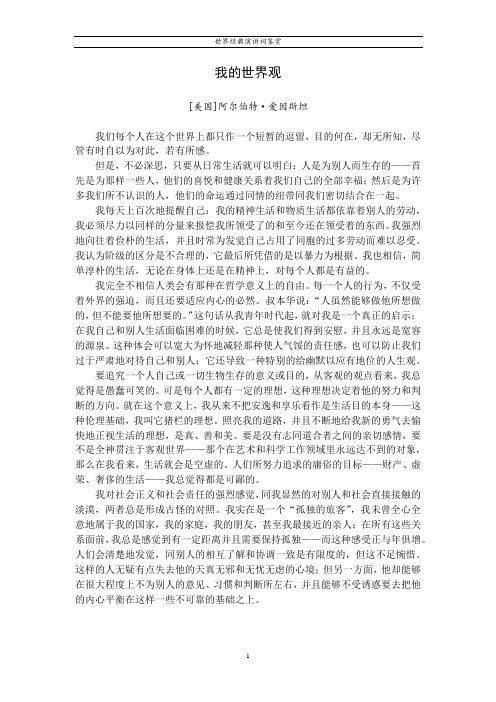
我的世界观[美国]阿尔伯特·爱因斯坦我们每个人在这个世界上都只作一个短暂的逗留,目的何在,却无所知,尽管有时自以为对此,若有所感。
但是,不必深思,只要从日常生活就可以明白:人是为别人而生存的——首先是为那样一些人,他们的喜悦和健康关系着我们自己的全部幸福;然后是为许多我们所不认识的人,他们的命运通过同情的纽带同我们密切结合在一起。
我每天上百次地提醒自己:我的精神生活和物质生活都依靠着别人的劳动,我必须尽力以同样的分量来报偿我所领受了的和至今还在领受着的东西。
我强烈地向往着俭朴的生活,并且时常为发觉自己占用了同胞的过多劳动而难以忍受。
我认为阶级的区分是不合理的,它最后所凭借的是以暴力为根据。
我也相信,简单淳朴的生活,无论在身体上还是在精神上,对每个人都是有益的。
我完全不相信人类会有那种在哲学意义上的自由。
每一个人的行为,不仅受着外界的强迫,而且还要适应内心的必然。
叔本华说:“人虽然能够做他所想做的,但不能要他所想要的。
”这句话从我青年时代起,就对我是一个真正的启示;在我自己和别人生活面临困难的时候,它总是使我们得到安慰,并且永远是宽容的源泉。
这种体会可以宽大为怀地减轻那种使人气馁的责任感,也可以防止我们过于严肃地对待自己和别人;它还导致一种特别的给幽默以应有地位的人生观。
要追究一个人自己或一切生物生存的意义或目的,从客观的观点看来,我总觉得是愚蠢可笑的。
可是每个人都有一定的理想,这种理想决定着他的努力和判断的方向。
就在这个意义上,我从来不把安逸和享乐看作是生活目的本身——这种伦理基础,我叫它猪栏的理想。
照亮我的道路,并且不断地给我新的勇气去愉快地正视生活的理想,是真、善和美。
要是没有志同道合者之间的亲切感情,要不是全神贯注于客观世界——那个在艺术和科学工作领域里永远达不到的对象,那么在我看来,生活就会是空虚的。
人们所努力追求的庸俗的目标——财产、虚荣、奢侈的生活——我总觉得都是可鄙的。
我对社会正义和社会责任的强烈感觉,同我显然的对别人和社会直接接触的淡漠,两者总是形成古怪的对照。

我从未在任何场合试图取悦别⼈----爱因斯坦《我的世界观》爱因斯坦简介:阿尔伯特·爱因斯坦(1879.3.14-1955.4.18)犹太裔物理学家。
他于1879年出⽣于德国乌尔姆市的⼀个犹太⼈家庭(⽗母均为犹太⼈),1900年毕业于苏黎世联邦理⼯学院,⼊瑞⼠国籍。
1905年,获苏黎世⼤学哲学博⼠学位,爱因斯坦提出光⼦假设,成功解释了光电效应,因此获得1921年诺贝尔物理奖,同年,创⽴狭义相对论。
1915年创⽴⼴义相对论。
爱因斯坦为核能开发奠定了理论基础,在现代科学技术和他的深刻影响下与⼴泛应⽤等⽅⾯开创了现代科学新纪元,被公认为是继伽利略、⽜顿以来最伟⼤的物理学家。
1999年12⽉26⽇,爱因斯坦被美国《时代周刊》评选为'世纪伟⼈'。
没有读他的著作《我的世界观》之前,我对他的认识只是他是⼀位著名的物理学家。
但看了此书后,我才发现他是⼀位如此博学多识,有才能,有思想的智者。
⼀、他的世界观他这样的世界观让我联想到柴静所说的:'⼈类只是个概念,⼀代⼀代⼈都是相似的⽣活,这辈⼦决定你悲欢的就是你⾝边的⼏个⼈。
”⼈是各种社会关系的总和。
⼈在微观上各不相同,但在主观上⼤致相同。
⼈是⼀样的,对幸福的愿望是⼀样的恶,对⾃⾝完整的需要是⼀样的,只要他⽣在这⼉,这么活着,我来到那⼉,那么活着,都是偶然。
⽐如我出⽣在农村,我没有背景关系没有⾦钱,那么我想取得财富,那就只有靠⾃⼰刻苦奋⽃寻找好的出路,这是很多⼈的⽣活历程。
⽽有⼀部分⼈是含着⾦钥匙出⽣的,他的⼈⽣起点就⽐别⼈⾼很⼤的阶层,我们普通⼈或许奋⽃哦⼏辈⼦也不能和他们⼀起喝咖啡。
因此,我们怎样活着,⼤多是个偶然。
也不必去羡慕别⼈的光鲜亮丽,⾃⼰过好⾃⼰的⼈⽣,内⼼获得快乐、幸福、宁满⾜,也是有价值的。
⼈与⼈之所以有阶级之分,有很⼤程度是利⽤强制⼿段维系,这在资本主义国家更为突出。
因此能实现阶级跨越的⼈,⼤多是付出了艰苦的努⼒,或者是好⼏代⼈的奋⽃得来的。

爱因斯坦我的世界观
爱因斯坦的《我的世界观》主要内容,主要涉及以下几个方面的内容:
1.宗教与科学:爱因斯坦信奉斯宾诺莎的上帝,即那个显示在存在事物的有秩序的和谐中的上帝,而非干预人类命运和行为的上帝。
他强调宗教在道德和利他主义层面的作用,认为人类有各种理由将高道德标准和价值观的宣告者们置于客观真理的发现者之上。
2.人生观:爱因斯坦认为人生的目的在于追求真理、美和善良。
他强调人类对宇宙及其奥秘的探索,并认为人类应该以理性、客观的态度去面对世界。
3.社会观:爱因斯坦关心社会进步和人类福祉,倡导和平主义和人道主义。
他关注社会公平、消除贫富差距等问题,并认为教育是实现社会变革的重要途径。
4.科学观:爱因斯坦阐述了科学与民主、自由的关系,认为科学是推动人类文明进步的重要力量。
他提倡培养独立思考的能力,鼓励人们勇于质疑、探索和创新。
5.价值观:爱因斯坦强调人与人之间的相互关爱和同情心,认为人类应该以平等、尊重和包容的态度对待他人。
他主张人类应该超越种族、国籍和信仰的界限,共同为世界的和平与进步而努力。
爱因斯坦的研究和成就是现代科学的瑰宝,他的思想和理念影响了全世界。
他的相对论、量子力学等理论成果,为科学家们提供了深
入探究宇宙奥秘的基石。
同时,他关心社会问题,积极参与和平与正义事业,展现出了一位杰出科学家的高尚品质。
爱因斯坦的《我的世界观》展示了他深刻的哲学思考、丰富的人生经验和崇高的人道主义精神。
这部作品不仅让人们更加了解这位伟大的科学家,还启发了人们对生活、科学、社会和价值观的思考。
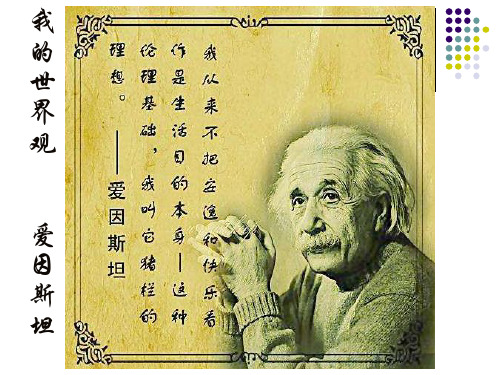
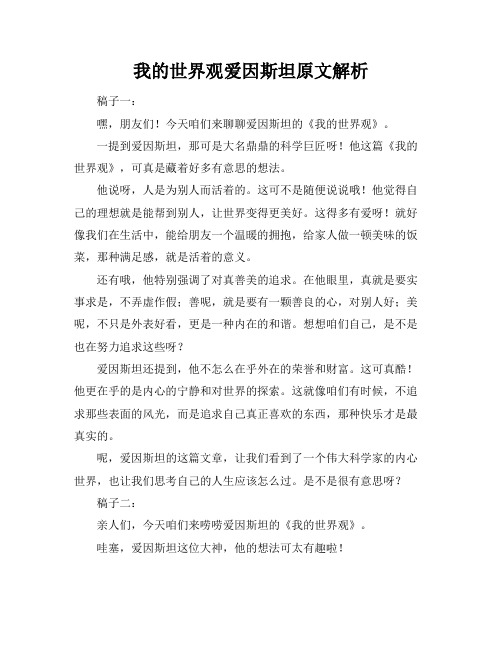
我的世界观爱因斯坦原文解析稿子一:嘿,朋友们!今天咱们来聊聊爱因斯坦的《我的世界观》。
一提到爱因斯坦,那可是大名鼎鼎的科学巨匠呀!他这篇《我的世界观》,可真是藏着好多有意思的想法。
他说呀,人是为别人而活着的。
这可不是随便说说哦!他觉得自己的理想就是能帮到别人,让世界变得更美好。
这得多有爱呀!就好像我们在生活中,能给朋友一个温暖的拥抱,给家人做一顿美味的饭菜,那种满足感,就是活着的意义。
还有哦,他特别强调了对真善美的追求。
在他眼里,真就是要实事求是,不弄虚作假;善呢,就是要有一颗善良的心,对别人好;美呢,不只是外表好看,更是一种内在的和谐。
想想咱们自己,是不是也在努力追求这些呀?爱因斯坦还提到,他不怎么在乎外在的荣誉和财富。
这可真酷!他更在乎的是内心的宁静和对世界的探索。
这就像咱们有时候,不追求那些表面的风光,而是追求自己真正喜欢的东西,那种快乐才是最真实的。
呢,爱因斯坦的这篇文章,让我们看到了一个伟大科学家的内心世界,也让我们思考自己的人生应该怎么过。
是不是很有意思呀?稿子二:亲人们,今天咱们来唠唠爱因斯坦的《我的世界观》。
哇塞,爱因斯坦这位大神,他的想法可太有趣啦!他在文章里讲,人生可不能光是为自己,得为别人做点啥。
就好比你帮小伙伴解决了一个难题,看到他开心的笑容,你自己心里也美滋滋的,这就是活着的价值嘛。
而且哦,他对于“目标”有独特的看法。
他觉得不能盲目跟风,要有自己真正热爱和相信的东西。
可不是嘛,咱们要是随大流,那多没意思,得找到自己心里真正想追求的,才有劲儿。
还有呢,他说自由和宽容特别重要。
就像我们在生活里,希望能自由自在地做自己喜欢的事,也能宽容地对待别人的不同。
这样,世界才会更美好呀。
说到这儿,我觉得爱因斯坦的世界观就像一盏明灯,照亮了我们前行的路。
让我们知道,要善良,要有追求,要活得有意义。
怎么样,亲人们,听完我这么一唠,是不是对爱因斯坦的这篇文章有了新的感受?。
我也是义和团
——在美国公共教育会议上的讲话
[美]马克·吐温
我想,要我到这里来讲话,并不是因为把我看作是一位教育专家。
如果是那样,就会显得在你们方面缺少卓越的判断,并且仿佛是要提醒我别忘了我自己的弱点。
我坐在这里思忖着,终于想到了我所以被邀请到这里来,是有两个原因。
一个原因是让我这个曾在大洋之上飘流的不幸的旅客懂得一点你们这个团体的性质与规模,让我懂得,世界上除了我以外,还有别的一些人正在做有益于社会的事,从而对我有所启迪。
另一个原因是你们之所以邀请我,是为了通过对照来告诉我,教育如果得法,会有多大的成效。
尊敬的主席先生刚才说,曾在巴黎博览会上获得赞扬的有关学校的图片已经送往俄国,俄国政府对此深表感谢——这对我来说,倒是非常诧异的事。
因为还只是在一个钟点以前,我在报上读到一段新闻,一开头便说:“俄国准备实行节约”。
我倒是没有料到会有这样的事。
我当即想,要是俄国实行了节约,能把眼下派到满洲去的3万军队召回国,让他们在和平生活中安居乐业,那对俄国来说是多大的好事。
我还想,这也是德国应该毫不拖延地干的事,法国以及其他在中国派有军队的国家都该跟着干。
为什么不让中国摆脱那些外国人,他们尽在她的土地上捣乱。
如果他们都能回到老家去,中国这个国家将是中国人多么美好的地方啊!既然我们并不准许中国人到我们这儿来,我愿郑重声明:让中国人自己去决定,哪些人可以到他们那里去,那便是谢天谢地的事。
外国人不需要中国人,中国人也不需要外国人。
在这一点上,我任何时候都是和义和团站在一起的。
义和团是爱国者。
他们爱自己的国家胜过爱别的民族的国家,我祝愿他们成功。
义和团主张要把我们赶出他们的国家。
我也是义和团。
因为我也主张把他们赶出我们的国家。
我把俄国的电讯再看了一下,这样,我对世界和平的梦想便消失了。
电讯上说,保持军队所需的巨额费用使得节约非实行不可,因而政府决定,为了维持这个军队,便必须削减公立学校的经费。
而我们则认为,国家的伟大来自公立学校。
试看历史怎样在全世界范围内重演,这是多么奇怪。
我记得,当我还是密西西比河上一个小孩子的时候,曾有同样的事发生过。
有一个镇子也主张停办公立学校,因为那太费钱了。
有一位老农站出来说了话,说他们要是把学校停办的话,他们不会省下什么钱。
因为每关闭一所学校,就得多修造一座监狱。
这如同把一条狗身上的尾巴用作饲料来喂养这条狗。
它肥不了。
我看,支持学校要比支持监狱强。
你们这个协会的活动,和沙皇和他的全体臣民比起来,显得具有更高的智慧,这倒不是过奖的话,而是说的我们心里话。
1901年11月13日
“博客来”博物馆。